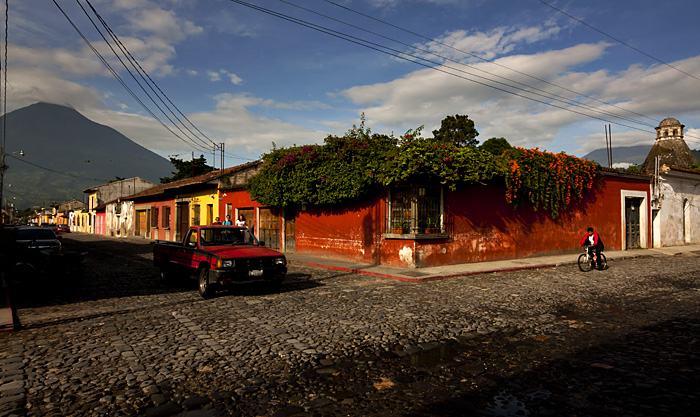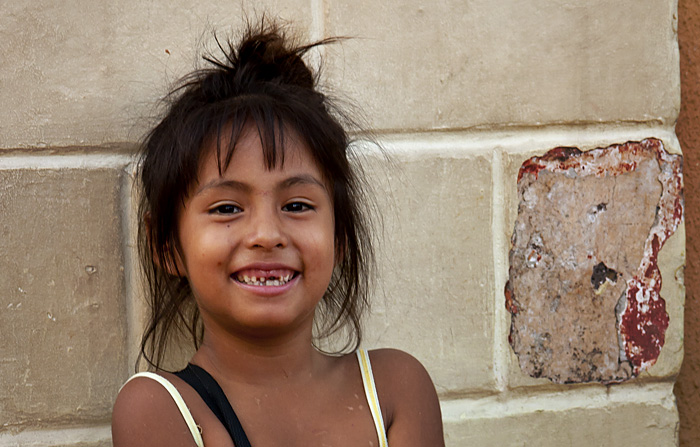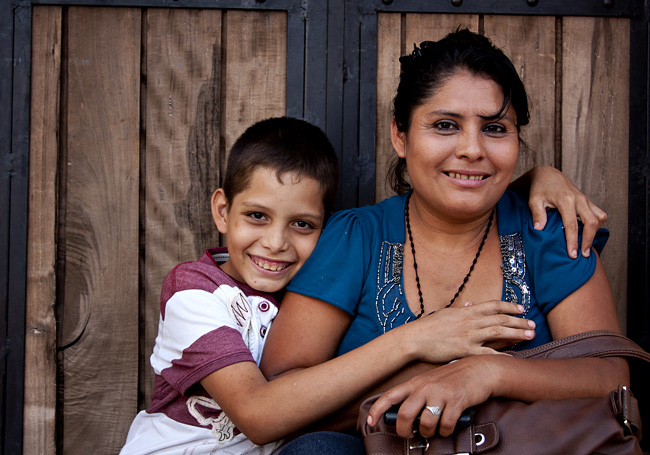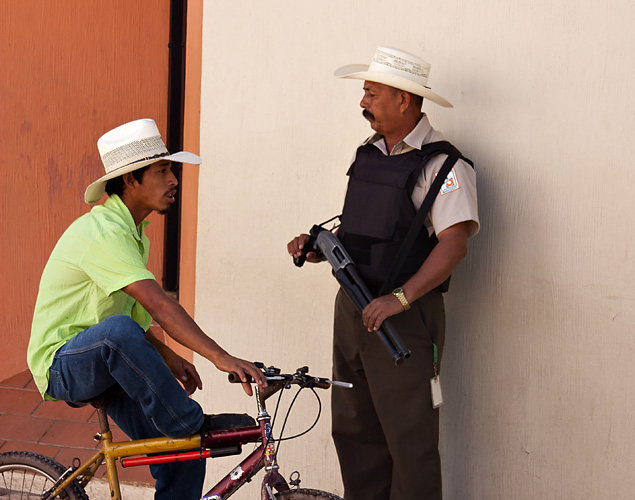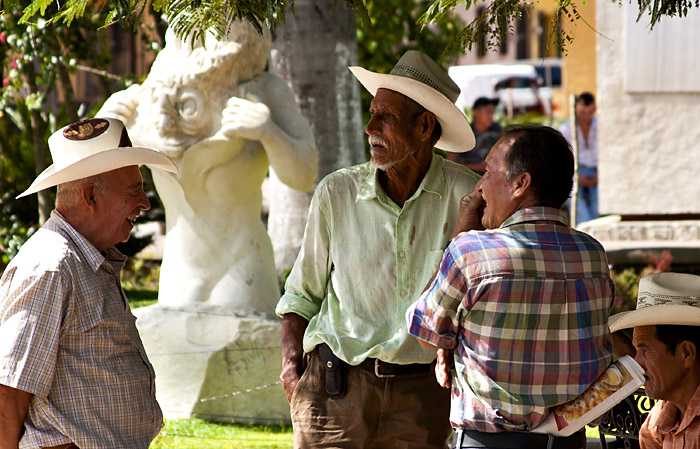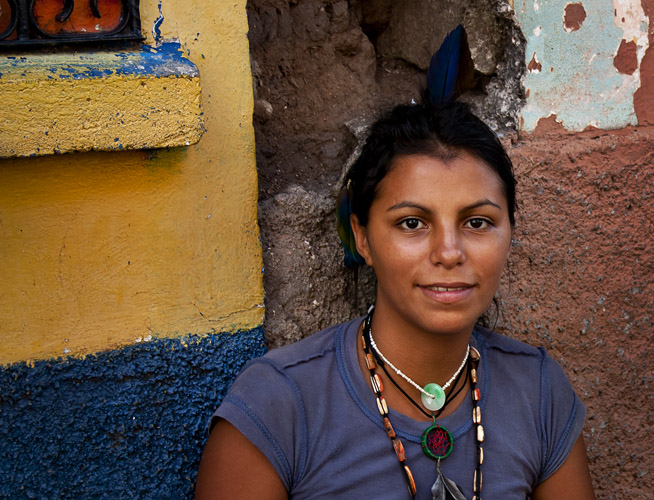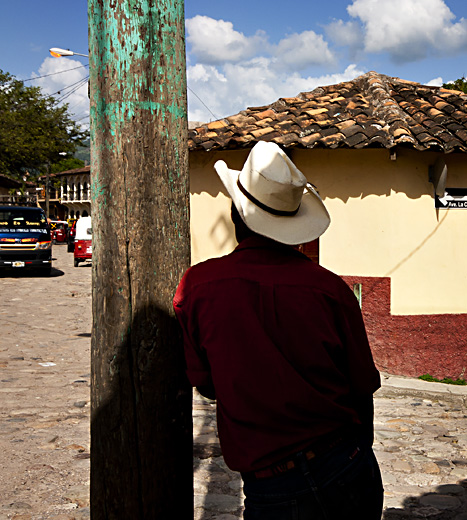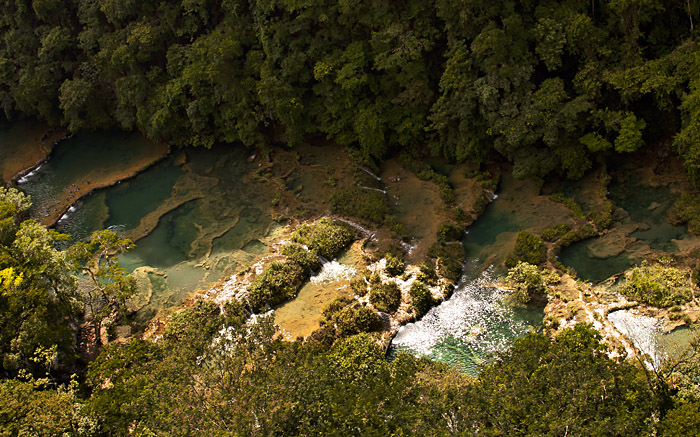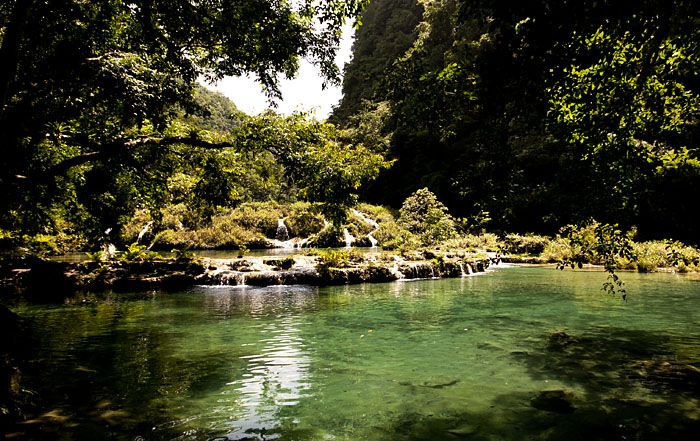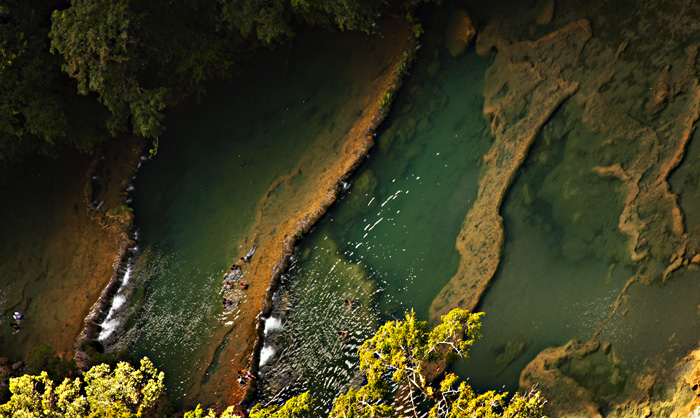Hello friends. I’m in Lanquín, again in Guatemala, after a brief trip in Honduras to visit the Mayan site of Copan.
In front of me flows the Rio Dulce, clear and green, with my mind synchronized on its course. Images of 6 months of travel form, pass, and disappear as in a dreamlike mosaic.
Nearby here there is one of the most spectacular places among those visited so far: Semuc Champey, a paradisiac canyon composed of natural freshwater pools.
And not only. There are caves inside which flows an underground river. We went inside with candles, swimming into the ice water of the dark cave for long stretches. Sometimes there were small waterfalls. Some parts inside the cave were spacious, others were claustrophobic. Some points were also a bit dangerous. For example, near the end of the tour, there was a tunnel about 1 meter wide and a few meters long, where the water entered with violence, filling it completely. To reach the exit, I had to cross it and, of course, it would have been impossible to breathe in the meanwhile. Following the guide’s instructions, I took a deep breath, and I abandoned myself to the forceful flow of water. I reached the other side of the tunnel without even having the time to understand what happened. Truly a fantastic place, even though the water was a bit too cold for my taste.
Another enjoyable experience, in a similar fabulous scenario, was floating inside a rubber donut on Rio Dulce, letting the currents carry me lazily.
Before coming here, as I said, I went to the Mayan site of Copan in Honduras. Not very big, but extremely impressive, with magnificent sculptures and stems, some in the museum nearby. It was located near the southern border of the Mayan empire and reached its peak between the fifth and ninth centuries AD.
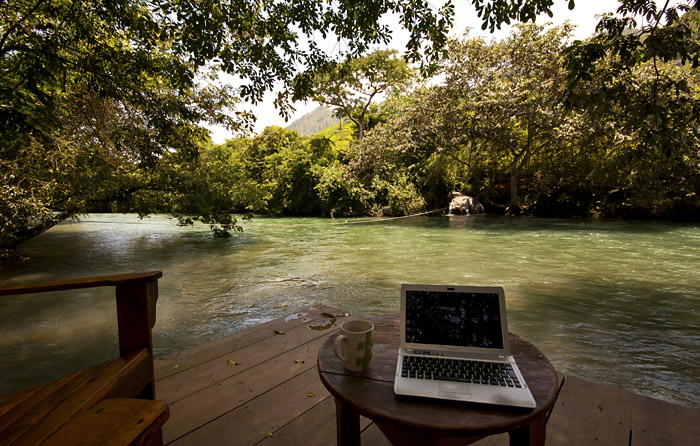 Here is where I’m now. It’s a hostel composed of huts by the river, where there are these platforms. At night, I prefer to sleep in a hammock beside the river, with its sound, under the stars.
Here is where I’m now. It’s a hostel composed of huts by the river, where there are these platforms. At night, I prefer to sleep in a hammock beside the river, with its sound, under the stars.
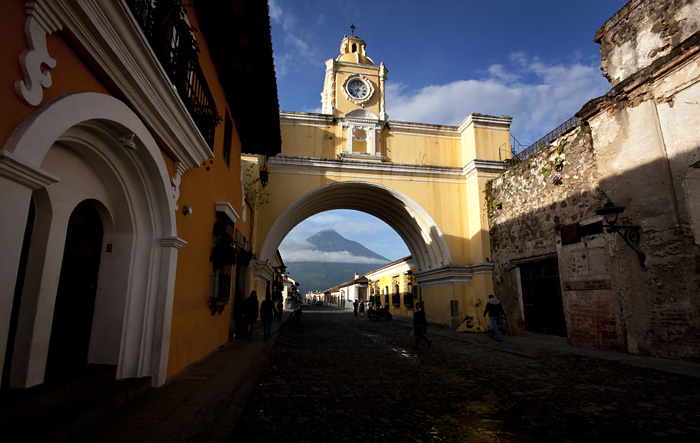 More photos of Antigua in Guatemala.
More photos of Antigua in Guatemala.
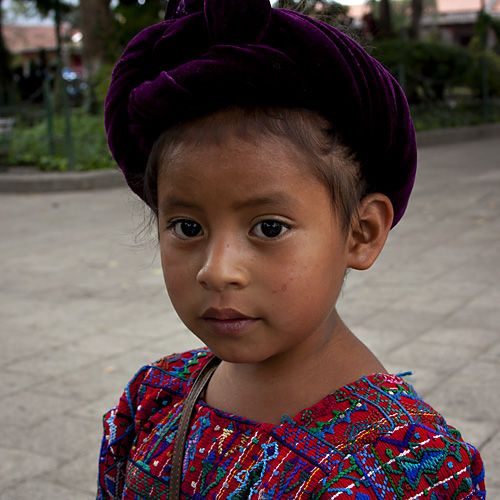 Little girl in Antigua. Over 50% of the population of Guatemala is a direct descendant of the Maya.
Little girl in Antigua. Over 50% of the population of Guatemala is a direct descendant of the Maya.
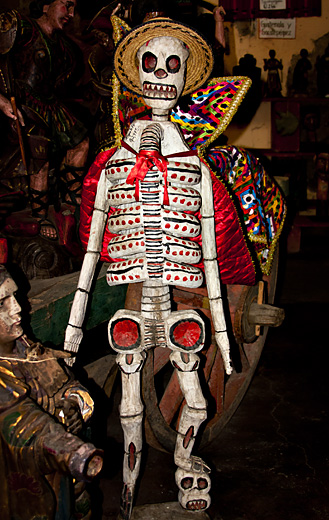 A skeleton in Antigua’s market. It seems to remind us: sooner or later… everybody. Sad but true… as I already noticed in my previous post.
A skeleton in Antigua’s market. It seems to remind us: sooner or later… everybody. Sad but true… as I already noticed in my previous post.
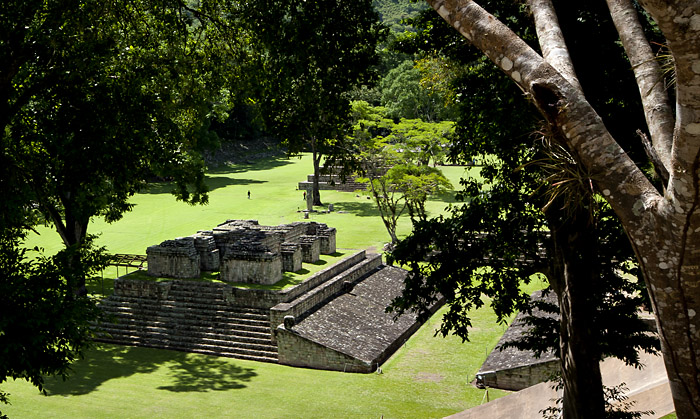 The Mayan site of Copan in Honduras.
The Mayan site of Copan in Honduras.
I have seen the hieroglyphs, read the survived codes and texts, and unfortunately I have to confirm that the world will finish on December 21 this year. Eh, I know, guys, that’s it! The fact is that the Mayan calendar ends precisely on that date. So far, I thought it was stupid to be frightened because it is as the switch from 1999 to 2000 or something similar. In reality, however, the Mayans predicted that when this happens, catastrophic disasters occur. And Maya priests didn’t make errors in their predictions. So, have fun in the few months remaining, and patience, it all ends. Nothing is forever.
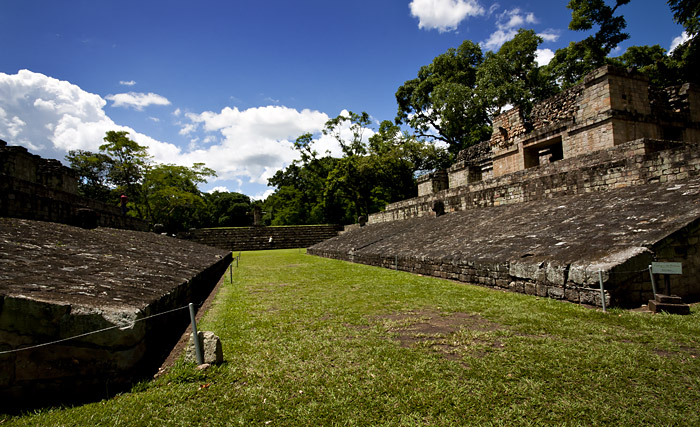 The ballcourt. We don’t know the exact rules. Probably, the players had to hit a rubber ball of about 4 kilos without letting it drop on the ground and trying to hit the sculptures placed on the top of one side (some of them, depicting macaw heads, are in the museum). Probably, it was similar to a gladiator game, with the losers sacrificed. However, other theories suggest that, after the game, the men sacrificed were actually the best players because it was considered a great honor for them. In this case, anyway, everyone played poorly on purpose, except the most stupids.
The ballcourt. We don’t know the exact rules. Probably, the players had to hit a rubber ball of about 4 kilos without letting it drop on the ground and trying to hit the sculptures placed on the top of one side (some of them, depicting macaw heads, are in the museum). Probably, it was similar to a gladiator game, with the losers sacrificed. However, other theories suggest that, after the game, the men sacrificed were actually the best players because it was considered a great honor for them. In this case, anyway, everyone played poorly on purpose, except the most stupids.
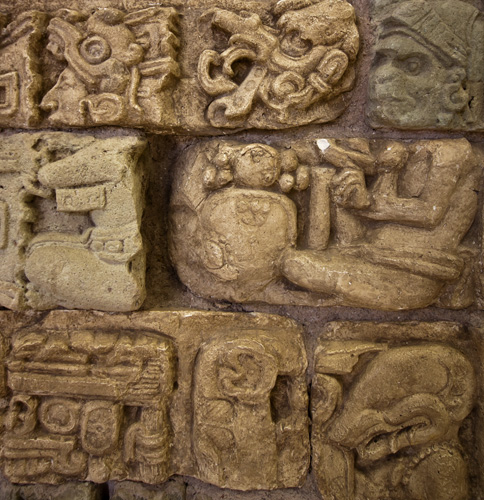 And here you can see the hieroglyphics clearly saying: “spend all the savings before December 21, 2012, because after they will be useless. But it will be tough to arrive at that date before being totally robbed by international finance and bankers. May they die. With pain. Together with the cops and judges who protect them”.
And here you can see the hieroglyphics clearly saying: “spend all the savings before December 21, 2012, because after they will be useless. But it will be tough to arrive at that date before being totally robbed by international finance and bankers. May they die. With pain. Together with the cops and judges who protect them”.
That is what is written. I’ve just done a literal translation. ![]()
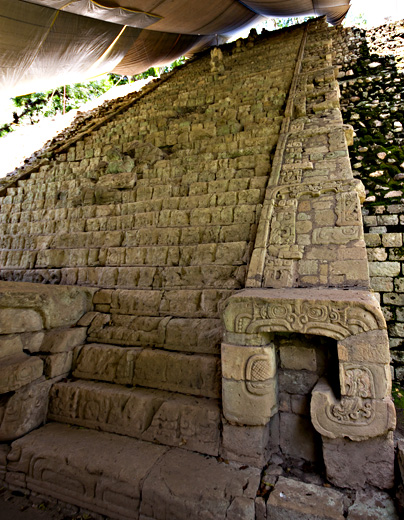 The striking hieroglyphic stairway, a text carved on the steps, the longest discovered Mayan text. Unfortunately, the meaning is not totally clear because some steps had fallen, and the first archaeologists put them back a bit at random, creating a sort of Dadaist cut-up. It seems, however, that is a record of the royal history of Copán.
The striking hieroglyphic stairway, a text carved on the steps, the longest discovered Mayan text. Unfortunately, the meaning is not totally clear because some steps had fallen, and the first archaeologists put them back a bit at random, creating a sort of Dadaist cut-up. It seems, however, that is a record of the royal history of Copán.
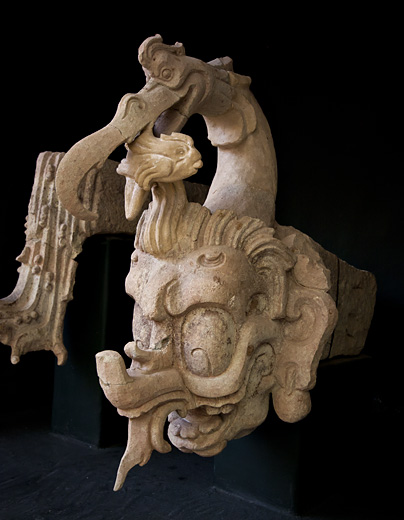 One of the many stunning Mayan carvings.
One of the many stunning Mayan carvings.
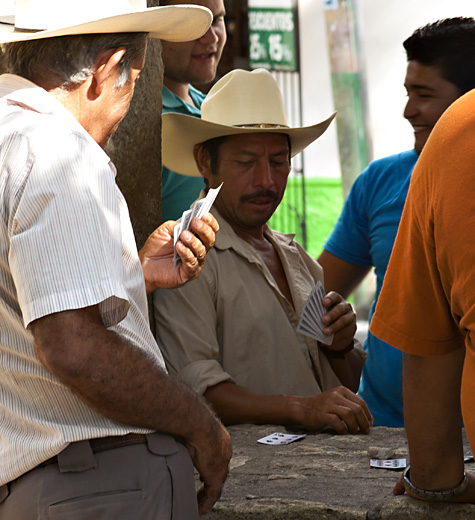 Card players in the town near the Mayan ruins. It is almost at the border with Guatemala.
Card players in the town near the Mayan ruins. It is almost at the border with Guatemala.
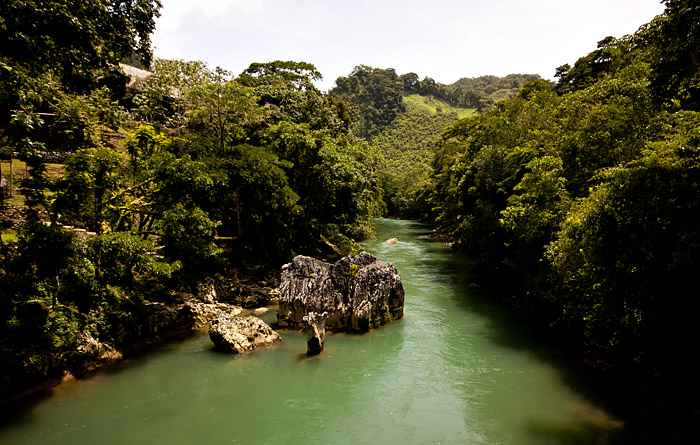 Back in Guatemala, part of the stretch of Rio Dulce that I did floating on a rubber donut.
Back in Guatemala, part of the stretch of Rio Dulce that I did floating on a rubber donut.
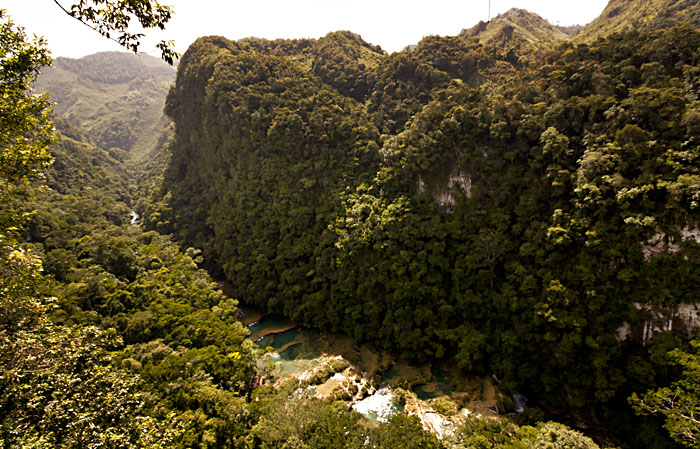 The delightful Semuc Champey. Rock walls of thick vegetation surround on both sides the natural pools underneath. Something curious happens: the river, which arrives very violent, enters into an underground tunnel, passes under these pools, and comes out after a few kilometers.
The delightful Semuc Champey. Rock walls of thick vegetation surround on both sides the natural pools underneath. Something curious happens: the river, which arrives very violent, enters into an underground tunnel, passes under these pools, and comes out after a few kilometers.
Hasta luego! ![]()






















































